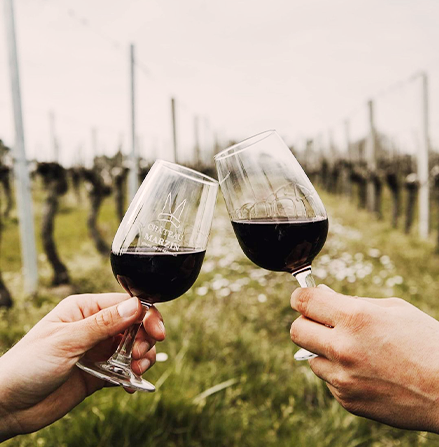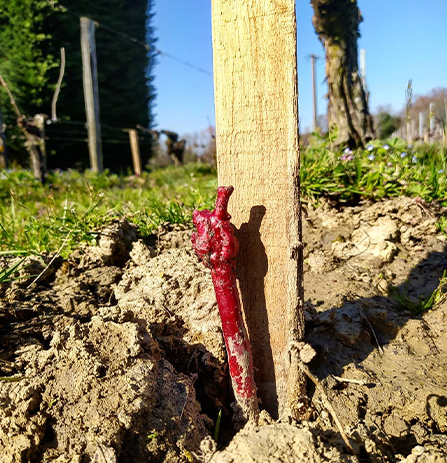Unite with nature
To us, it is evident that natural practices will enable us to ensure the sustainable vineyards. It is only human that we want to master everything, however this has transformed wine growing into a monoculture. We consider that wine is the expression of an ecosystem including the soils, the chosen cultivation methods, the biodiversity and the impact of human activity.
These ecosystems are what we call The Atmospheres
The Atmospheres are to be preserved
Biodiversity is found everywhere around the vine plot: in bushes, trees, ponds, small walls, ditches, waterways, etc. But it’s also found in the vine plot itself, where both plant and animal life exist. Biodiversity is our precious ally. Let’s learn about it and it will enable us to access and embrace its benefits.
It is therefore our responsibility to preserve biodiversity and ensure to leave this legacy to future generations.
Developing the Atmospheres
The interaction between living beings is sometimes poor, not to mention non-existent. Nothing is impossible, so let’s roll up our sleeves and get to work!
Let’s encourage agroforestry (growing trees and other types of cultivation on the same plot) and permaculture. There are many benefits that result from this, such as:
- The development and modification of microclimate plots, which ensures the selection of auxiliary species living in the vine and in the soil.
- Installation of shelters for auxiliary fauna, as close as possible to the vines.
- The modification of the plots’ climate through provisions of shade and adjustments of wind direction
- The introduction of 4-legged farm friends, such as sheep, goats and pigs
- The enhancement and promotion of rural landscape
To drink wine, is to drink the soil!
Above all, wine is the result of a long process from soil to our palates. It makes sense to say that wine comes from grapes, as much as it makes sense to say that the vine comes from the soil.
Let’s avoid a soil tasting session…we’ll leave it to the earthworms! Nevertheless, here are a few basic principles that we should follow:
- Develop crop covers and grass cover management
- Establish farming methods that allow water and oxygen transfers (thanks to storage and drainage systems) to ensure exponential grapevine roots and microorganism growth.
- Favour “soft” ways of working, including ploughing with horses (however, we remain adaptable to the environment and situations)
- Use natural soil amendments, sometimes from mixed farming methods
- Boost the web of underground life and its bacteria


The vine, a powerful yet fragile liana
It’s the star of the vineyard, everyone knows it! However, both rigorous and humble working philosophies must be implemented so as to ensure the best possible grapes.
Each situation is different and requires a different approach (sustainable, organic, biodynamic farming methods, etc.). We consider that these methods require certain adjustments, according to your specific situations. However, common sense urges us to do the following:
- Implementing the use of natural methods to prevent and treat disease
- Improved adaptation of rootstocks and grape varieties
- Refining pruning techniques
- Applying vine vigour control
- And most importantly, close daily monitoring of your land
The current debate: climate change management
It’s undeniable that climate change has had a direct impact on wines and their quality. Periods of drought have been more recurrent in summer. no translation.. Beyond the increase in temperature and its lower yields, we find ourselves questioning the sustainability of the land and the vineyards.
All that is found within our Charter of Common Sense can be used as tools that enable us to adapt in the best way we can for the years to come.
Water Managementu
All actions previously introduced facilitate ways to capture water for the vineyard and to return it to the natural environment.
Complementary measures can also be implemented, such as:
- Establishing specific natural areas to limit rainwater runoff
- Redevelopment of plots suffering from erosion and runoff
- Implementation of water recycling systems
The wisdom of our actions
Just like any human activity, viticulture has a substantial environmental impact. Rather than put the blame on ourselves or deny the obvious, the focus should be placed on the means of acting in order to reduce these impacts, and the bills!
- Electricity, water and fuels are part of the daily activity of a winery and there are many ways to reduce their consumption
- Viticulture produces a lot of waste, some of which can be recycled thanks to agronomic use as well as innovative methods (upcycling) – Let’s be creative!
- We often hear that the best waste is the one that is never produced. So we have to think about it from the start, this is what is called responsible purchasing. Let’s be smart!
